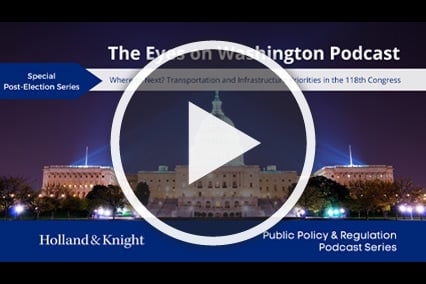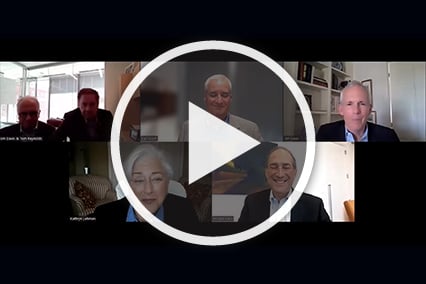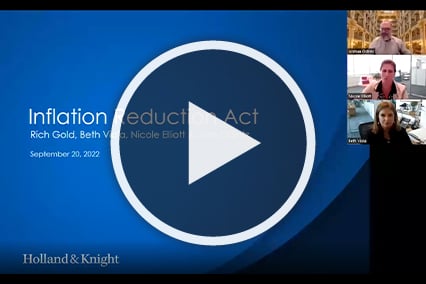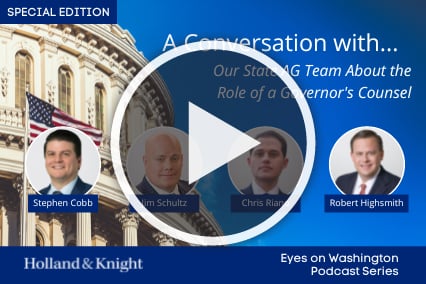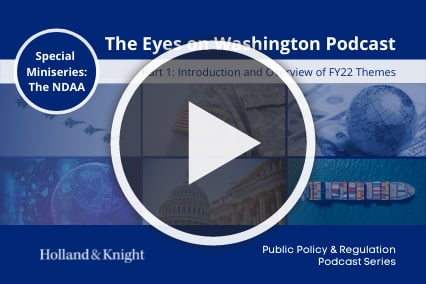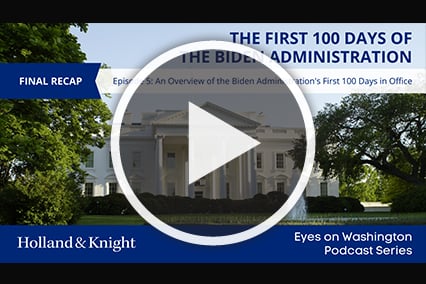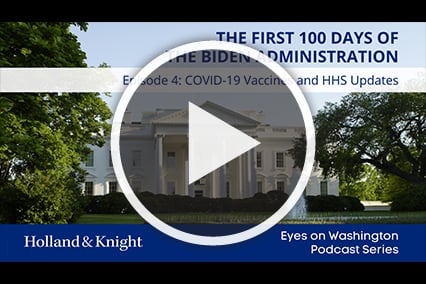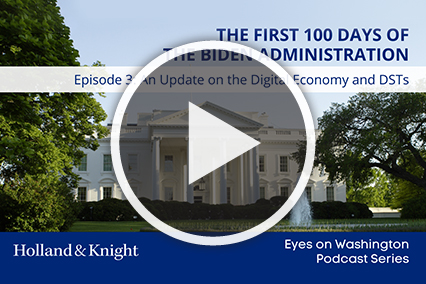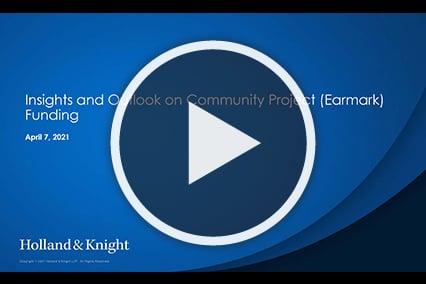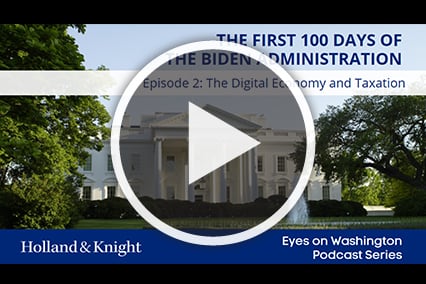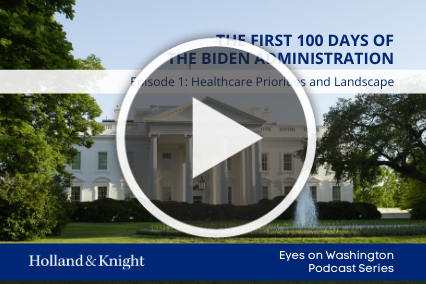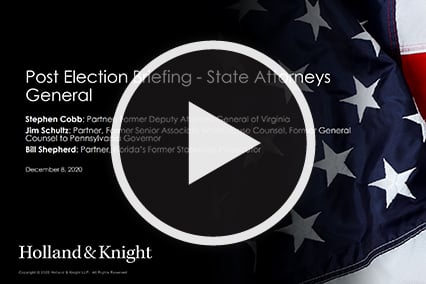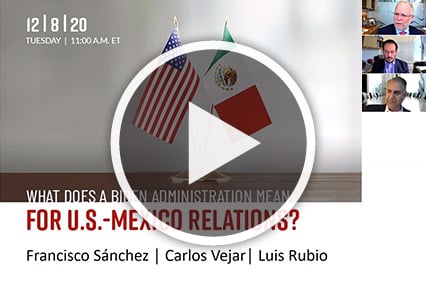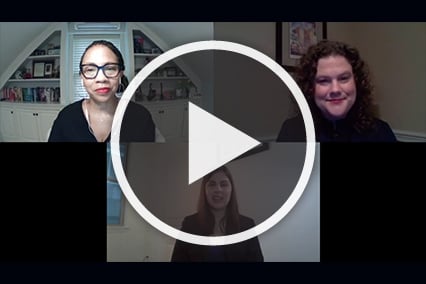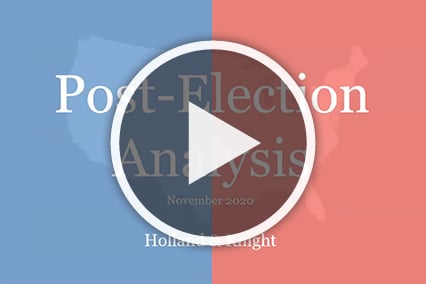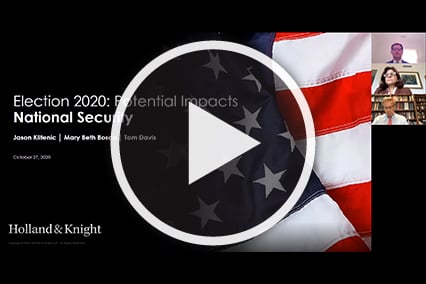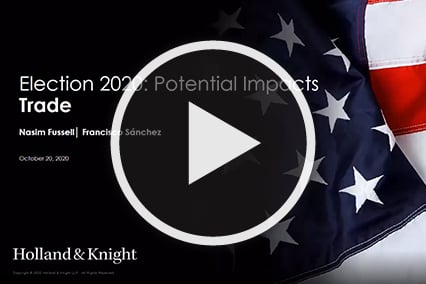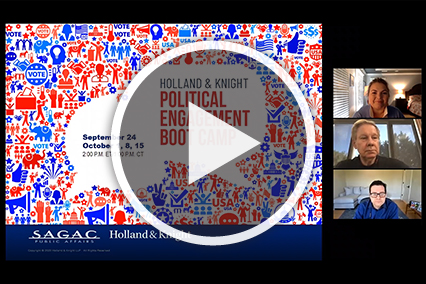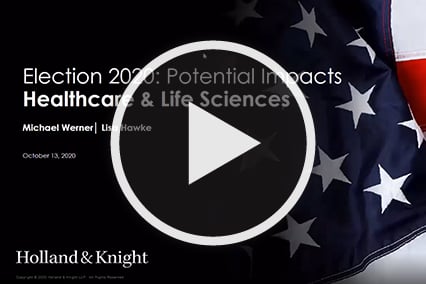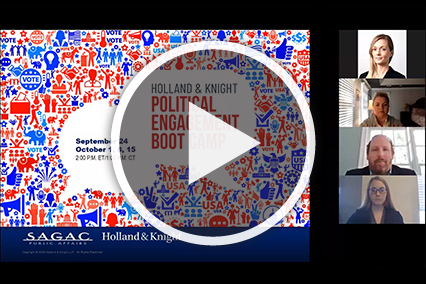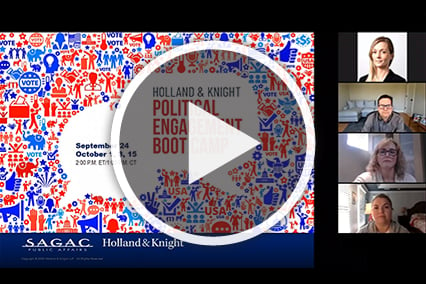Political Law and Government Ethics
- As a leading political law practice, Holland & Knight's Political Law and Government Ethics Team is nationally recognized for counseling blue chip companies, financial institutions, high-net-worth individuals and public officials on the full range of political law, government ethics and compliance matters.
- The team has deep experience guiding clients through complex regulatory frameworks at the intersection of politics, law and business, including campaign finance, lobbying, pay-to-play and the Foreign Agents Registration Act (FARA), with a particular focus on issues where the public and private sectors converge.
- Our attorneys serve as trusted advisors in high-stakes political engagements, including governmental investigations, presidential appointments and the confirmation process, as well as politically sensitive transactions across the United States and globally.

Overview
Holland & Knight's Political Law and Government Ethics Team stands at the forefront of political law practices nationwide, with extensive experience advising a wide range of clients navigating the complex and evolving legal frameworks that govern political activity, lobbying, ethics and public-sector engagement. Our lawyers and professionals regularly counsel public and private companies, financial institutions, political appointees, asset managers, high-net-worth individuals, nonprofits and strategic counseling firms on regulatory risks and compliance strategies involving political law in Washington, D.C., across state capitals, and around the world.
Whether advising a nominee through the federal vetting process, structuring a cross-border political compliance program or supporting a corporation in a politically sensitive investigation, our team combines legal acumen with deep institutional knowledge of regulatory bodies, political dynamics and enforcement trends. Key aspects of Holland & Knight’s Political Law and Government Ethics practice include:
- serving as outside political counsel to multinational corporations, presidential campaigns and high-profile political figures
- advising blue chip companies and financial institutions on lobbying, campaign finance, pay-to-play, municipal advisor laws, and gift and entertainment laws
- representing asset managers, placement agents and financial services firms in building and maintaining political law compliance programs for capital raising and public sector investments
- guiding nominees through presidential appointments, U.S. Senate confirmations, and ongoing government ethics and disclosure requirements
- counseling U.S. corporations on cross-border political frameworks and Foreign Agents Registration Act (FARA) compliance, utilizing our deep experience in Europe and Latin America
- providing strategic advice and litigation support on the Freedom of Information Act (FOIA), the Federal Advisory Committee Act (FACA), administrative law and public corruption regimes
- collaborating with global trade associations and thought leaders on best practices in political law risk management and government ethics
Compliance Counseling and Political Law Advisory Services
Holland & Knight’s Political Law and Government Ethics Team provides comprehensive regulatory counsel on the full scope of federal, state, local and international political law regimes. With deep experience across various industries, we advise clients on the legal intricacies and evolving regulations that impact their political activities and business operations, including:
- campaign finance laws
- the Lobbying Disclosure Act (LDA) and state and local lobbying laws
- FARA matters
- state, local and federal pay-to-pay rules, including Municipal Securities Rulemaking Board (MRSB) Rule G-37, U.S. Securities and Exchange Commission (SEC) Rule 206(4)-5, Commodity Futures Trading Commission (CFTC) Rule 23.451 and Financial Industry Regulatory Authority (FINRA) Rule 2030
- municipal advisor and placement agent regulations
- gift and entertainment laws, revolving door restrictions, conflicts of interest and blind trusts
- political intelligence and the Stop Trading on Congressional Knowledge (STOCK) Act
We design and implement enterprise-wide political law compliance programs tailored to client-specific operations and risks, conduct internal reviews and investigations, and advise on a wide variety of enforcement matters, including congressional investigations and politically sensitive corporate transactions.
Financial Services and Major Asset Managers
Our attorneys and professionals serve as trusted political law advisors to many of the world’s leading financial institutions, including domestic and foreign banks, private equity firms, broker-dealers, hedge funds, insurance companies and real estate investment managers. In connection with such representations, our Political Law and Government Ethics Team:
- advises on pay-to-play laws and placement agent rules impacting investment advisors, swap dealers and municipal advisors
- negotiates political law provisions in side letters with public sector investors
- assists with procurement lobbying, conflict-of-interest and disclosure obligations
- develops compliance matrices tailored to more than 250 public-sector entities
Vetting and Appointee Counsel
Holland & Knight advises presidential nominees through the appointment and Senate confirmation process – the largest such practice in the U.S. The vetting journey can be daunting, especially for those transitioning from the private sector or academia, as well as for individuals with complex investment portfolios, sophisticated trust and estate plans, or significant employee benefit and executive compensation arrangements. The lead partners within our practice have taught the nation's first course on the presidential appointment process at Harvard Law School and Georgetown University Law Center for more than 15 years.
For more than two decades, Holland & Knight's Political Law and Government Ethics lawyers and professionals have guided individuals through every facet of the intricate vetting process. We have represented appointees in Democratic and Republican administrations and work closely with the White House Office of General Counsel, the U.S. Office of Government Ethics, designated ethics officials from a wide range of departments and agencies, and the staffs of U.S. Senate committees of jurisdiction. Our clients include U.S. ambassadors and potential nominees for ambassadorial positions, senior White House staff, nominees to Senate-confirmed positions in the national security and intelligence community, nominees for the U.S. Department of State and U.S. Department of the Treasury, and corporate clients with principals or executives appointed to senior executive branch positions.
Our team offers comprehensive counsel to individuals and their employers through the full range of issues, including:
- counseling nominees on government ethics, tax, national security and disclosure requirements
- assisting with post-confirmation compliance, including conflict-of-interest rules, security clearance, financial disclosure and qualified blind trusts in accordance with the Ethics in Government Act
- advising employers of appointees on separation agreements, proprietary information protection and nomination-related legal risks
Cross-Border and Global Compliance
Our Political Law and Government Ethics Team routinely advises clients on international political law regimes, with a particular focus on Europe and Latin America. Recognized as thought leaders by global trade associations, our attorneys and policy professionals are often invited to speak on and advise U.S. parties regarding international political law issues, including global lobbying regulation, the prohibition on foreign national involvement in U.S. elections and FARA.
Additionally, our lawyers and professionals advise international corporations, trade associations, strategic advisory and consulting firms, and law firms on compliance with FARA. Overseen by the U.S. Department of Justice (DOJ) National Security Division, FARA chiefly governs actions conducted on behalf of foreign entities aiming to influence U.S. public policy or opinion.
Holland & Knight's Political Law and Government Ethics Team is fully equipped to provide counsel on all aspects of FARA compliance to help ensure that our clients navigate this complex regulation with confidence and precision.
Litigation, Investigations and Enforcement
When political activity becomes the focus of legal scrutiny, clients trust our Political Law and Government Ethics Team to step in and help guide their response. We represent clients in some of the most politically sensitive litigation, government investigations and enforcement actions in the country. From campaign finance enforcement and public corruption allegations to ethics inquiries and lobbying violations, our attorneys have extensive experience in defending clients at the intersection of law, politics and public perception.
Our team works closely with litigators, white collar defense counsel and crisis management professionals to develop integrated strategies that minimize legal exposure and protect reputational interests in high-stakes political and regulatory matters.












